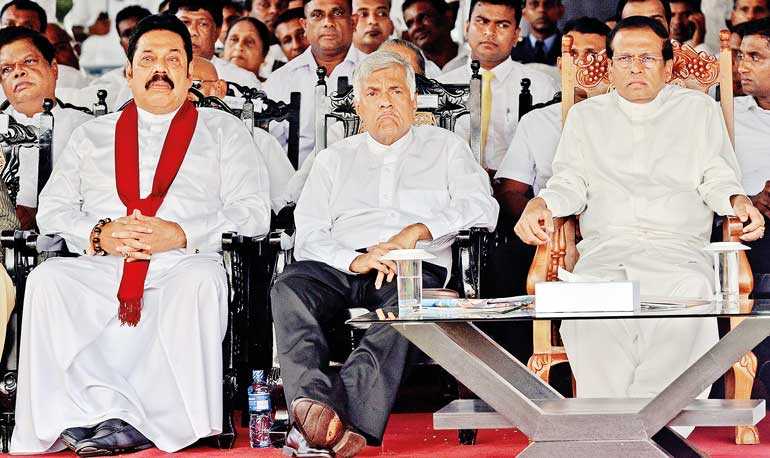Friday Feb 20, 2026
Friday Feb 20, 2026
Tuesday, 27 November 2018 00:00 - - {{hitsCtrl.values.hits}}

At his Sunday meeting with foreign correspondents, President Sirisena did not play any trump cards. It appears that he has either put all his cards on the table or has run out of trumps.
He will not reappoint Ranil Wickremesinghe. He has wiped the slate clean with Mahinda Rajapaksa. He has concluded that the former President is a forward-thinking type in comparison to Ranil, whom he has likened to a privileged Pinocchio with a duplicitous nose as drawn out as the bond commission report.
He has convinced himself that he has acted strictly within the powers vested in him. He does not see any absurdity, ambiguity or anomaly in replacing Ranil’s ‘crony’ plutarchy with Mahinda’s family oligarchy.
President Sirisena will not reappoint Ranil Wickremesinghe. He has wiped the slate clean with Mahinda Rajapaksa. He has concluded that the former President is a forward-thinking type in comparison to Ranil, whom he has likened to a privileged Pinocchio with a duplicitous nose as drawn out as the bond commission report

This insistence by President Sirisena on his monopoly of truth and authority is what Hitler’s crown jurist Carl Schmitt defined as ‘Sovereign exceptionalism.’ Sirisena may not know it. But he is relying on the same thought process used by all Fascists known in history.
Modern constitutional law subscribing to the concept of sovereignty in ‘We the people’ does not acknowledge a single bearer of sovereign authority.
Schmidt in his tract ‘Political Theology’ argues that ‘there can be no functioning legal order without a sovereign authority’ – the same argument that neo fascists such as Wimal Weerawansa, Vasudeva Nanayakkara and Dinesh Gunewardene make in their call for a centralised presidency. We must not blame Mahinda Rajapaksa. He did not either vote for or advocate the 19th Amendment. That man has principles and disciples who pounce on them!
The pro-fascist jurist Carl Schmitt in his ‘Political Theology’ asserts that a “Sovereign is he who decides on the exception”. That is precisely the warped logic relied on by the High Priest of the Kelaniya Temple and the ‘Podi Hamuduruwo’ of Hunupitiya Gangaramaya when they heartily endorsed Sirisena’s new choice of a Prime Minister. To them ‘sovereignty’ is not the collective will of the people but of decision and domination – the personal privilege of the ruler.
Restoring the premiership of the privileged Pinocchio is not our concern. But we must read the signs of these dark times unerringly.
It was fascinating to watch Dinesh Gunawardena delivering his homily on why a minority should make up a majority in the standing committee planning the business of the House. These atrocious perversions in Parliament were made by serious politicians who know what they are talking about.
Watching the perfidy of Dinesh Gunewardene, though painful held out some hope for the future.
Such forays into political madness have their limitations. The Marxist philosopher Adorno writing in exile described the early days of Hitler’s rise. In his ‘Minima Moralia: Reflections of Damaged Life,’ he says, “No one who observed the first month of national socialism could fail to perceive the moment of mortal sadness, of half knowing surrender to perdition that accompanied the manipulated intoxication, the torch light processions and drum beating.”
Do those words not sound familiar to us in Sri Lanka in the tail-end of year 2018? Do we not experience a sadness in intoxication, experiencing a catastrophe when we were hoping to celebrate democratic renewal and death when we hoped to feel the birth pangs of a society governed by the rule of law?
Let us take stock of the situation.
This insistence by President Sirisena on his monopoly of truth and authority is what Hitler’s crown jurist Carl Schmitt defined as ‘Sovereign exceptionalism.’ Sirisena may not know it. But he is relying on the same thought process used by all Fascists known in history
Someone has precipitated a parliamentary crisis. What happens then?
Corrupt and inefficient politicians are denounced. The threat of anarchy and disorder has to be met with decisive historic action by the patriotic leadership. Breakdown of public order, inflation, economic decline and national interest demands a strong government to save the country. This is not the text of a filing by a Colombo-based foreign correspondent who attended last Sunday’s press briefing by President Sirisena.
It is a rough synopsis of page 382 of the book ‘Fascism – Past, Present and Future’ by Historian Walter Laquer. He reminds us that Fascism is always a movement of protest and discontent. But we must ask, ‘Who is protesting and whose discontent are they voicing?’
Fascism has many shades and many names. People are attracted to Fascism or some shade of it for a variety of reasons. But there is one principal factor that precipitates the descent in to the horror of fascism – it is a manifestation of a moral and a cultural crisis in which traditional values, religious as well as humanist no longer act as restraints and as guarantees of political decency. Fascism arises when democracy develops a delirium.
Hitler came to power by undermining a democratic constitution. The first article of that democratic constitution stated simply with no adornment that power of the state proceeds from the people.
After Hitler became Chancellor, the German playwright Bertolt Brecht wrote a fabulously ferocious poem about what happened to the power that proceeded from the people. It makes great reading today.
From the People proceeds
the power of the State.
But where does it proceed to?
Yes, where is it proceeding to?
There’s some place it’s
proceeding to.
The policeman proceeds through the
station gate.
But where does he proceed to?
Look, there’s the whole lot on the march.
But where are they marching to?
Yes, where are they marching to?
There’s some place they are marching to.
They wheel through the gate and under the arch.
But where are they wheeling to?
The power of the State turns right about.
Something is in the air.
What can be in the air?
There’s something in the air.
The power of the State
gives a piercing shout
And yells: Get moving there!
But moving why and where?
It yells: Get moving there!